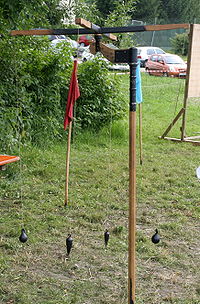
Groma surveying
Encyclopedia

Roman Empire
The Roman Empire was the post-Republican period of the ancient Roman civilization, characterised by an autocratic form of government and large territorial holdings in Europe and around the Mediterranean....
surveying
Surveying
See Also: Public Land Survey SystemSurveying or land surveying is the technique, profession, and science of accurately determining the terrestrial or three-dimensional position of points and the distances and angles between them...
instrument. It comprised a vertical staff with horizontal cross pieces mounted at right-angles on a bracket. Each cross piece had a plumb line hanging vertically at each end. It was used to survey straight lines and right-angles, thence squares or rectangles.
The same name was given to:
- the center of any new military camp, ie the point from which was traced the regular grid by using the groma instrument
- the center of a new town, from which the gromaticiGromaticiGromatici , or agrimensores, was the name for land-surveyors amongst the ancient Romans...
(surveyors) began to lay out cardoCardoThe cardo was a north-south oriented street in Roman cities, military camps, and coloniae. The cardo, an integral component of city planning, was lined with shops and vendors, and served as a hub of economic life. The main cardo was called cardo maximus.Most Roman cities also had a Decumanus...
and decumanusDecumanus MaximusIn Roman city planning, a decumanus was an east-west-oriented road in a Roman city, castra , or colonia. The main decumanus was the Decumanus Maximus, which normally connected the Porta Praetoria to the Porta Decumana .This name comes from the fact that the via decumana or decimana In Roman city...
grid, with a plough and a pair of oxen
The groma surveying instrument originated from Mesopotamia
Mesopotamia
Mesopotamia is a toponym for the area of the Tigris–Euphrates river system, largely corresponding to modern-day Iraq, northeastern Syria, southeastern Turkey and southwestern Iran.Widely considered to be the cradle of civilization, Bronze Age Mesopotamia included Sumer and the...
, from where it was imported by the Greeks
Greeks
The Greeks, also known as the Hellenes , are a nation and ethnic group native to Greece, Cyprus and neighboring regions. They also form a significant diaspora, with Greek communities established around the world....
in the 4th century BC. Subsequently, it was brought to Rome by the Etruscans
Etruscan civilization
Etruscan civilization is the modern English name given to a civilization of ancient Italy in the area corresponding roughly to Tuscany. The ancient Romans called its creators the Tusci or Etrusci...
.

